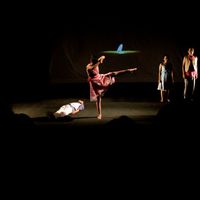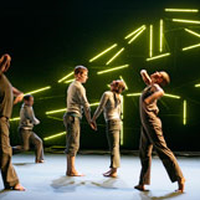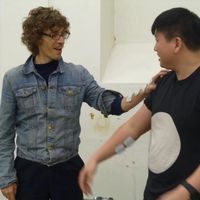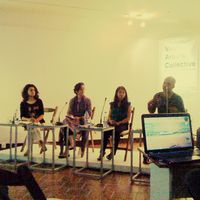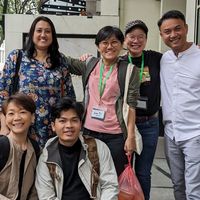Reflections on the Asia-Europe Dance Forum
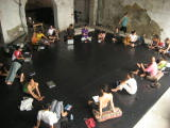 [caption id="attachment_2123" align="alignright" width="170" caption="Pointe to Point Asia-Europe Dance Forum "]
[caption id="attachment_2123" align="alignright" width="170" caption="Pointe to Point Asia-Europe Dance Forum "] [/caption]
[/caption]The sixth edition of the Asia-Europe Dance Forum successfully took place in Portugal from 12th till 27th June 2009, hosted by Alkantara in Lisbon. The focus of the 2009 project is to provide an avenue for new inspirations, discoveries and to instigate dance enquiry. The programme brought together a core group of 9 European and 9 Asian artists working in the field of dance and continues to support the development of spin-off or follow-up activities.
At the end of the two weeks Forum in Lisbon, Sasiwimon Wongjarin, Project Officer Cultural Exchange interviewed for the participants for culture360.org. To know what they learnt – from a cultural and artistic perspective – from their Asian and European peers.
Antonio Tagliarini (Italy) found the most positive aspects of Pointe to Point was the great opportunity to spend time with artists from different cultures and the opportunity to exchange experiences with them.
Citra Pratiwi (Indonesia) said she had the best learning experience in Lisbon. Pointe to Point Dance Forum 2009 changed her for sure - as a person, creator and a performer. It’s like, she has just opened the new door, and she can see how wonderful it is for being outside. This meeting brought a new meaning towards understanding cultural differences. At first, some differences seemed very foreign, but she soon began to appreciate them by understanding them. She can distinguish between “creator, difference, understanding, and possibility”.
For Cosmin Manulescu (Romania), Pointe to Point was an excellent opportunity and perfect frame to discover a fascinating Asian world, full of colour, identity and creativity. The forum opened him the desire to think more about the relation between tradition and contemporary life and learn about different approaches and aesthetics of his Asian colleagues".
Having battled between her Asian and European identities, I-Chen Zuffellato (Italy) felt the meeting was like being at home. It was, professionally, a starting point to find a way to be in both continents. Europe and Asia are quite big words that become cliché in certain ways of thinking: A duality.
Things though, are often much more complex. The meeting revealed some clichés but also destroyed some others. People identified through the group, and the behaviours of the group. The personal revelation of this meeting for I-Chen was the word ‘exoticism’, a term that many participants used to define her in relation to their European or Asian points of view. The word ‘exotic’ brought a new light, it sounded like a positive way of talking about something indefinable. I-Chen reckons that we are all exotic to each other. It was just a matter of perception.
She left the Forum with more questions than answers: how to be critical, how to observe, how to discuss, how to collaborate, how to propose, how to rest, how to have fun, how to shift from one language to another, how to meet, how to take time, how to reflect, how to be silent?
Teresa Prima (Portugal) thought about the effects of globalization and how our lives, behaviours and work are no longer different from each other. This made her realise that our historical, social, geographic, educational background is the base of what we are and the richness of each particular person.
Sioned Huws (United Kingdom) thought that the Pointe to Point Dance Forum 2009 was complex in its topics: contemporary society, tradition, and technology. However, she felt it was impossible to address all of these issues in any depth; technology was the aspect she chose to address the least as it is a medium that needs time, much patience and great expertise to go beyond a video image, to achieve works that have a real time interaction. In her past works made with technology, they have been achieved by finding people with similar interests, bringing resources and expertise together, to make a work that could only be realized through that collaborative process. Technology and the body is a whole Dance Forum in itself.
Pointe to Point 2009 was a great opportunity to meet artist from different parts of Asia. For her, it was an opportunity to understand the other person’s cultural background, up-bringing, and tradition from a contemporary perspective. She wanted to know the reality of that person’s working situation today, how do they survive, work, how the direction of their work is changed or determined by practical issues such as finances, lack of studio space or great cost of space and the employment of performers.
On the last day of the Forum, she found out that Nunu Kong (China) worked in a gallery context and less on the physical aspect of her performance work because studio spaces in Shanghai were expensive. She felt Nunu was one of the artists she was closest to in terms of her passion for movement and would have liked to have spent some time in the studio with her.
With Fahmi Fadzil (Malaysia), she found that there is an understanding that every place is a place, every action is an action and some things are precious and should not be touched; the ritual of every day life.
Talking to Citra Pratiwi, she realised how cultural traditions impose a limit on dress code and subsequently on movement, which differ for both men and women. Many Asian traditional dance forms are expressive in the arms, hands and face, eyes and each movement has meaning. How much of the body can be revealed affects contemporary and traditional dress. Yet, certain restriction can be overcome, such that works can be equally performed in Asia and Europe. So much of what we take for granted in the west, has to be considered more consciously in Asia.
Fu Kuen (Singapore) learnt the importance of the exotic and realised that perhaps exoticism was too much viewed from a western perspective. In the west, we have a tendency to lay claim a discovery of something or someone of an exotic culture, as if it only exists because we discovered it, but of course that culture has always existed and continues to exists without western interference. There is a fear of speaking of the exotic because of the dominance of western or Americanized perspectives in the world.
The Forum offered Takao Kawaguchi (Japan) a complicit understanding of the importance of giving time, however short or long.
Seon-ja Seo (Korea) has the opinion that Europeans develop through discussion, where there is a freer atmosphere to talk about anything. There is also a mutual understanding and respect for differing views.
An understanding of a hierarchical system in the arts which exists everywhere leads to information and knowledge being shared less freely, even in some cases inaccessible. This makes her understand and realize even more so, the importance of Dance Forums such as Point to Point as a place to share and exchange artistic practices.

